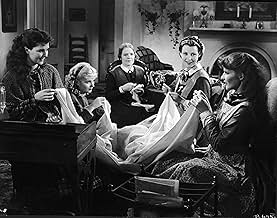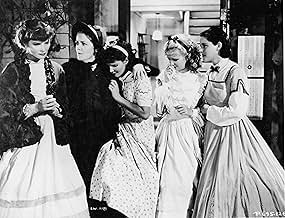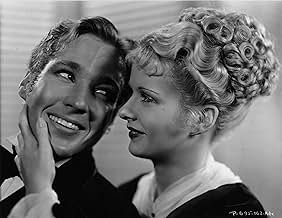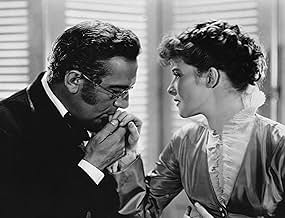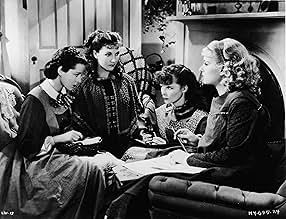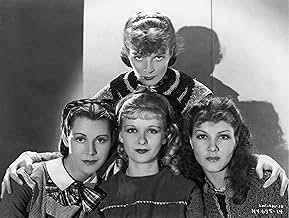IMDb RATING
7.1/10
8.3K
YOUR RATING
A chronicle of the lives of sisters growing up in 19th-century New England.A chronicle of the lives of sisters growing up in 19th-century New England.A chronicle of the lives of sisters growing up in 19th-century New England.
- Won 1 Oscar
- 7 wins & 4 nominations total
John Lodge
- Brooke
- (as John Davis Lodge)
Samuel S. Hinds
- Mr. March
- (as Samuel Hinds)
Nina Borget
- Housekeeper
- (uncredited)
Francesca Braggiotti
- Dance Teacher
- (uncredited)
Luke Cosgrave
- Old Man
- (uncredited)
Featured reviews
I will always have a soft spot for this film, and to me it is the best version of the three versions I've seen so far of Little Women(1994 and 1949 were the others, and I liked both of them very much). The sound here is a little too tinny, and the Laurie of Douglass Montgommery is too fey for my tastes. However, it still looks beautiful, the costumes and hairstyles are well suited to the period, the sets are sumptuous and the film is very handsomely shot. There is also a stirring score from Max Steiner, making it sound appropriately nostalgic, the script is faithful and warm-toned, it is directed with great taste by George Cukor and the story has all the warmth and poignancy of the book, which is one of my favourites of all time. Apart from Montgommery I loved the acting, Edna May Oliver here does what she did best, more than convincingly play sharp-tongued spinsters, and Henry Stephenson is a dear Mr Laurence. Paul Lukas is an unexceptional but romantic Professor Bhaer, an improvement on the wooden and too-Italianate Rosanno Brazzi in the 1949 film, and Spring Byington a Marmee of real sincerity. The four March girls Meg, Jo, Beth and Amy(aka the Little Women of the title) are what drive the story, and all four really shone here. Joan Bennett is appealing as Amy and leaves room for character growth from a vain little girl to an elegant young lady. Jean Parker is a very sweet and moving Beth, and Frances Dee is beautiful as Meg should be. Best of all is the Jo of Katharine Hepburn, who is perfectly cast in a role she was born to play. All in all, truly lovely and the best version to me. 9/10 Bethany Cox
It's always a wonderful feeling when a film works its wonders on you. LITTLE WOMEN had that effect on me, and I'm not even a fan of these types of stories. This adaptation of the Louisa May Alcott classic has real heart, warmth, and the right amount of sentimentality, amounting to a wonderful film. Katharine Hepburn stars as the tomboyish Jo, a free-spirited young lady who is dying for adventure but craves the time she spends with her sisters. The one that stands out among the four is Beth, a caring, sweet girl with a flair for the piano. If you don't get teary-eyed about her cause, you definitely pass for a curmudgeon. The only complaint I have about this gem is that the last quarter of the film doesn't seem to have the matching effervescence that the rest of the film had. It ends abruptly and off-balance. All qualms aside, this is a genuine classic, filled with great performances and characters you can't help but like. A true family entertainment. Rating: Three stars and a half.
Having grown up with the Technicolor version of the 40s with a young Liz Taylor and a perky June Allyson, I was pleased to find this was just as good a version, better in many ways. Katharine Hepburn, as you might expect, is wonderful as the tomboy Jo March, who finds responsibility after a lifetime of woe for the family. Other cast stand-outs include Edna May Oliver as Aunt March. Laurie is a bit of a wet fish though. Both early versions are much, much better than the Winona Ryder one of the 90s, which was a sentimental Hollywood nostalgia trip which just didn't work. I'm still split between the two early ones but this is a definite favourite and I'd highly recommend it.
In fanfiction there is the phenomenon called the "Mary Sue"--a character who is an (idealized) version of the author who is inserted into the story to act out the author's fantasy. The original Mary Sue was in a Star Trek fanfiction where Ensign Mary Sue was braver than Kirk, smarter than Spock, more compassionate than McCoy, etc. who is able to save the day when nobody else can.
What has this, I hear you ask, to do with 'Little Women'? I think that all the March girls, but especially Jo, are somewhat Mary Sues to Louisa May Alcott. They are just too perfect. Especially Beth. Oscar Wilde said of Dickens' Little Nell that it would take a heart of stone not to laugh out loud reading her death scene; the same remark could apply to Beth. And Marmee is just to saintly and patient to be believed.
Still, in spite of it all, the film was worth watching, especially to see the young Kate Hepburn. I especially appreciate the time when she was asked when she would grow up and act like a proper lady, and she replied, "Never! Even when I'm old and walk with a cane!" (Or something to that effect.) Highly prophetic, as that was exactly how Kate lived.
What has this, I hear you ask, to do with 'Little Women'? I think that all the March girls, but especially Jo, are somewhat Mary Sues to Louisa May Alcott. They are just too perfect. Especially Beth. Oscar Wilde said of Dickens' Little Nell that it would take a heart of stone not to laugh out loud reading her death scene; the same remark could apply to Beth. And Marmee is just to saintly and patient to be believed.
Still, in spite of it all, the film was worth watching, especially to see the young Kate Hepburn. I especially appreciate the time when she was asked when she would grow up and act like a proper lady, and she replied, "Never! Even when I'm old and walk with a cane!" (Or something to that effect.) Highly prophetic, as that was exactly how Kate lived.
From the opening titles displaying a snow covered Curier and Ives - like print underscored by a melody played on a tinkling spinet, this 1933 version of Louisa Alcott's beloved novel holds one in thrall. A Civil War era tale of a New England family's joys and tribulations centers on the March household : mother "Marmee" and her four daughters; Meg, Amy, Beth and Jo. The screenplay centers on each girl's commitment to "showing her father proud", father being a minister gone of f to war to meet the spiritual needs of the Yankee soldiers. Buoyed by their mother [ the ever perfect Spring Byington ] the girls learn the meaning of giving and sacrifice with a jollity that may be off-putting to 21st century viewers; but stick with it, for what this picture offers is nothing less than real life at its most joyful and painful. After a series of seemingly inconsequential events, the girls' placid lives are disrupted when a sibling takes ill. This section of the movie is riveting, due to the superb direction of George Cukor and Katherine Hepburn as the tomboyish Jo. The scene where Jo retreats to the attic, worried sick over the fate of her ill sister, is gut wrenching. Hepburn was just hitting her stride as a movie actress when this film came out. Not the typical glamour girl of the time, her odd beauty and diction translated into a strange alchemy when projected on a movie screen : she is unforgettable. The other actresses acquit themselves beautifully but the picture belongs to Hepburn. Lest you think all is dour and dull, this movie offers so much that is truly entertaining : a heartwarming homecoming scene; the March girls presenting a "play" in their living room to the consternation and delight of invited neighbors and several moments involving a cantankerous but lovable aunt [ the ubiquitous Edna May Oliver ]. The movie is properly accoutered with lovely interiors and authentic production design and costumes [ gabled houses and ivy covered porches; hoop skirts and muffs ]. The entire production is like a gift wrapped edition of the novel turned to celluloid! The icing on the cake, so to speak, is Max Steiner's spare, evocative music score, employing Beth's piano playing for family get togethers, parties etc., and orchestral "commentary" for dramatic, comic and action sequences. Only six years had passed since sound recording had revolutionized the film industry, but this "early talkie" uses the new technology very adeptly; although camera movement is minimal, the editing is very fluid. The sound, courtesy of old Western Electric, is fine, especially on the recent DVD release, where both aural and visual elements have been restored, assuring a great presentation. When a movie has the power to reach out over a span of seven decades and touch jaded hearts in another century, that is a sign of a classic. LITTLE WOMEN is a great American film.
Did you know
- TriviaKatharine Hepburn asked costume designer Walter Plunkett to copy a dress her maternal grandmother wore in a tintype photograph.
- GoofsIn the Christmas play when the prop tower falls down, Jo's lips aren't moving when she says "Everything is all right."
- Quotes
Beth March: You're old enough now to leave off boyish tricks and behave better, Josephine. Now you are so tall and turn up your hair, you must remember you're a young lady.
Jo March: No, l'm not. And if turning up my hair makes me so, l'll wear it down till l'm a hundred!
- Crazy creditsPaul Lukas as Professor Bher is not listed in the closing credits.
- Alternate versionsOlder video and television prints remove the original RKO logo in the opening and replace it with the one from Selznick International.
- ConnectionsFeatured in David O. Selznick: 'Your New Producer' (1935)
- SoundtracksThe Girl I Left Behind Me
(uncredited)
Traditional
Played during the opening scene
Details
- Release date
- Country of origin
- Languages
- Also known as
- Las cuatro hermanitas
- Filming locations
- Providencia Ranch, Hollywood Hills, Los Angeles, California, USA(exterior of March house)
- Production company
- See more company credits at IMDbPro
Box office
- Budget
- $424,000 (estimated)
- Runtime
- 1h 55m(115 min)
- Aspect ratio
- 1.37 : 1
Contribute to this page
Suggest an edit or add missing content


